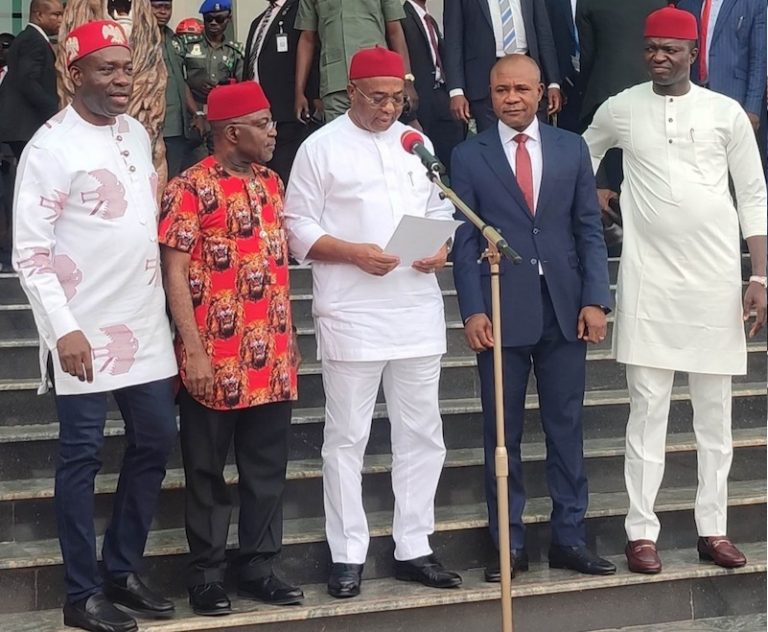
Amid concerns over the inability of Southeast governments to articulate and drive significant economic development in the region due to persistent insecurity, leading private sector players have stepped up to bridge the gap.
Using a fourth-quarter economic outlook meeting as a springboard, these stakeholders resolved to craft a comprehensive roadmap for economic growth. This plan would address pressing governance and security challenges while advocating for private-sector-led initiatives to unlock the region’s latent potential.
The meeting saw discussions on leveraging the Southeast’s diaspora communities—both local and foreign—for investment opportunities in the zone. There was also a strong call for establishing an Eastern Economic Summit to provide a focused platform for regional development and advocacy.
Register for Tekedia Mini-MBA edition 19 (Feb 9 – May 2, 2026): big discounts for early bird.
Tekedia AI in Business Masterclass opens registrations.
Join Tekedia Capital Syndicate and co-invest in great global startups.
Register for Tekedia AI Lab: From Technical Design to Deployment (next edition begins Jan 24 2026).
Attendees included industry stalwarts such as Dr. Cosmas Maduka, President/CEO of Coscharis Group; Mr. Johnson Chukwu, Managing Director/CEO of Cowry Assets Management Ltd; Etemore Glover, CEO of Impact Investors Foundation; and Prof. Franklin Ngwu, Director at Lagos Business School, among others.
In opening remarks, Prof. Ngwu, who moderated the session, underscored the region’s significant but underutilized human capital and material resources. He emphasized that private sector initiatives have become imperative as governments, especially in the region, appear overwhelmed with distractions and unable to focus on economic transformation.
Leading the discussions, Mr. Johnson Chukwu highlighted the region’s economic potential, drawing parallels between the Southeast and the Jewish diaspora’s successful reintegration and development of Israel. He urged the Southeast community, especially its entrepreneurs, to invest in their homeland despite the prevailing security challenges.
“The Jews, in response to existential threats, decided to return to Israel and invest in their homeland, making it one of the world’s most progressive nations. We can replicate this in the Southeast,” Chukwu said.
He identified political exclusion, economic deprivation, and governance failure as the three critical factors driving insecurity in the region.
“If we reduce these factors by creating employment through investments, we can drastically mitigate the causes of unrest. Private sector leaders have a pivotal role in this transformation,” he added.
Dr. Cosmas Maduka echoed Chukwu’s sentiments, advocating for the creation of an Eastern Economic Summit. He stressed that such a platform would integrate regional economic strategies and highlight the region’s potential to stakeholders.
“Rwanda, which is far less endowed in natural and human resources than the Southeast, is doing far better. Why can’t we achieve the same? The answer lies in an integrated, strategic approach,” Maduka noted.
Reflecting on the challenges posed by leadership, Maduka lamented, “Leadership detached from the realities of life cannot provide solutions. To attract investment capital, we need the right environment. When we create this, opportunities will naturally follow.”
Diaspora Investments and Public-Private Partnerships
The meeting also emphasized the role of the Southeast diaspora in driving regional development. Glover highlighted the need for innovative strategies to attract diaspora capital, both from within Nigeria and abroad.
“Diaspora communities now wield significant financial power. We need mechanisms to channel this wealth into productive ventures in the Southeast,” she said. “However, addressing the perceived security risks and creating a conducive investment environment are crucial.”
Glover advocated for robust public-private partnerships (PPPs) as a vehicle to unlock the region’s potential, stressing that collaborative efforts between governments and private entities could bridge existing gaps.
DevEast: A Platform for Collaboration
The meeting was hosted by DevEast, a social impact organization focused on revitalizing the Southeast economy. Its CEO, Mr. Collins Unegbu, reaffirmed the organization’s commitment to empowering entrepreneurs and fostering economic collaboration in the region.
“Our mission is to develop the Eastern economy by providing platforms for entrepreneurs and businesses while advocating for strategic regional collaborations,” Unegbu stated.
The Missing Seaport Link
While the private sector initiative has been lauded, analysts argue that for the Southeast to achieve its full economic potential, the Federal Government must decentralize seaport services. Many believe that the centralization of port activities in Lagos is a major bottleneck for the region’s development.
Calls for the development of Eastern seaports, such as the Onne, Calabar, and Warri ports, have intensified. Stakeholders believe that the Federal Government’s refusal to prioritize these ports stems from a bias toward Lagos, which benefits economically from its status as the primary maritime hub.
“I’m from Brass Island in Bayelsa and I’ll keep pushing the debate in every room I am in that Akwa Ibom and Cross Rivers need functional deep sea ports,” Economic analyst, Kelvin Emmanuel, said.
“The Easter Maritime Flank needs as much priority like the West. Sea ports are more consequential to an economy than airports, and my thesis is that a functional sea port with proper port categorization on the most strategic items is key to opening up commerce in the South-South, South-East, North-Central and North-East,” he added.
Emmanuel urged the new MD of NPA to urgently broaden the port categorization of the Onne Deep Sea Port from just E&P.



